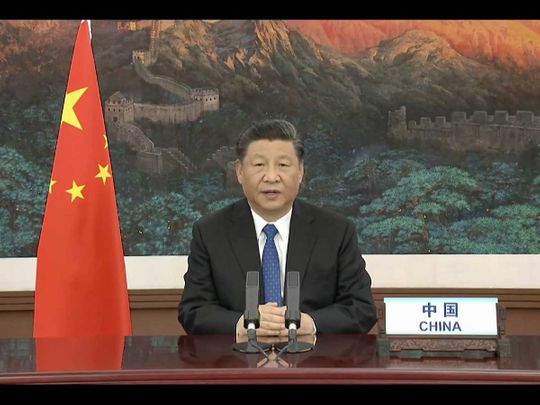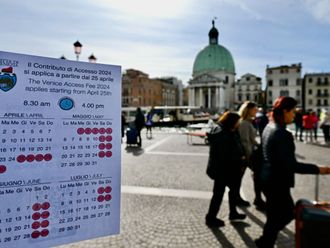
Beijing: Chinese leader Xi Jinping called on the world Monday to rally behind the World Health Organisation and support developing countries as he opened a WHO annual assembly that had been foreshadowed by weeks of acrimonious jostling between China and the United States and its allies over a proposal to investigate the origins of COVID-19.
Xi’s speech, delivered over video at the invitation of WHO Director General Tedros Adhanom Ghebreysus, signalled a growing sense of assuredness from China. For weeks it had been anticipating - and bitterly opposing - a proposal from Western countries to conduct an international probe into the pandemic’s beginnings, generally believed by scientists to be in Wuhan.
China’s opposition has melted in recent days as international support for an inquiry grew to include Russia, Turkey and European and African countries, and drafts of the proposed resolution showed a focus on international collaboration to manage the pandemic and relatively limited emphasis on questioning its source.
Another prospect that China objected to vehemently - a Taiwanese presence at the World Health Assembly - also dissolved Monday after Foreign Minister Joseph Wu said Taiwan would withdraw its bid for observer status, which Beijing had been blocking.
Xi used his speaking platform on Monday to not only support the mooted international review once the pandemic was over but to air his own initiatives. Framing China as a defender of the international community and particularly the developing world, Xi announced $2 billion donation to the United Nations and offered to help set up hospitals and health infrastructure in Africa.
Any vaccines produced by China would also be considered a global public good and shared, Xi said as he called on countries to lend their support to the critical work of the WHO and Tedros, who had both come under fire from President Donald Trump for their alleged coziness with the Chinese government.
China's support for international cooperation
“At this critical juncture, to support the WHO is to support international cooperation and the battle to save lives,” Xi said. “China takes as its responsibility not only the lives and health of its citizens but global public health.”
In an address that contained repeated references to China’s support for multilateral institutions and developing countries, particularly Africa, Xi appeared to be differentiating himself from Trump at a time when the two countries are locked in a duel over economic primacy and global influence.
Rather than address allegations that Chinese officials covered up early signs of the outbreak in Wuhan, Xi called on the world to “step up information sharing.” China provided information to the WHO and other countires in a timely fashion and released the genome sequence of the coronavirus at the earliest time, he said
“All along we have acted with openness, transparency and responsibility,” Xi said. “We have done everything in our power to support and assist countries in need.”
The Chinese government has repeatedly characterised the pandemic as a crisis that is global in nature and called any targeted inquiry that draws disproportionate attention to covid-19’s roots in Wuhan as an unfair plan by Washington and its allies to make it a scapegoat.
After the Australian government proposed an international investigation last month, China threatened to boycott Australian products and later effectively cut imports of Australian beef.
The draft resolution, submitted by the European Union on Monday and currently supported by over 100 nations, does not mention Wuhan or China. It asks the World Health Organization to work with other United Nations agencies to “identify the zoonotic source of the virus and the route of introduction to the human population, including the possible role of intermediate hosts.”
The document does not propose a review to identify missteps in how countries handled the outbreak and is instead forward-looking and calls on the WHO to potentially arrange “scientific and collaborative field missions” to help prevent similar future outbreaks. It also appears to rule out the possibility that the virus was man-made or experimented upon - a possibility that US officials have raised but is considered unlikely by most epidemiologists.
The Trump administration, which has denounced China - and the WHO - as largely responsible for the global pandemic, has not signalled whether it would also back the resolution.
Speaking to reporters on Monday, Chinese Foreign Ministry spokesman Zhao Lijian said a review that focused on finding the animal source of the virus and assessing the performance of the WHO response was “consistent with the Chinese position.”
Zhao denied that China was opposed to an international inquiry and said China had participated in drafting the resolution all along.












